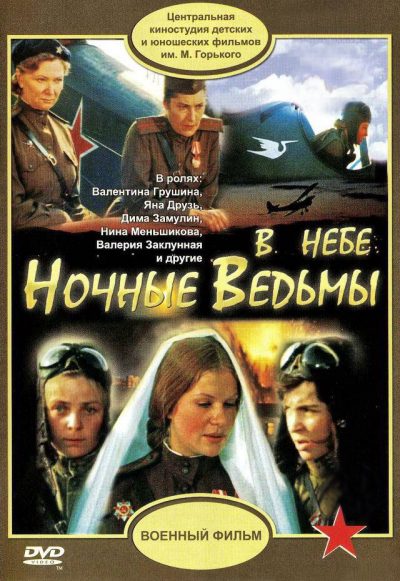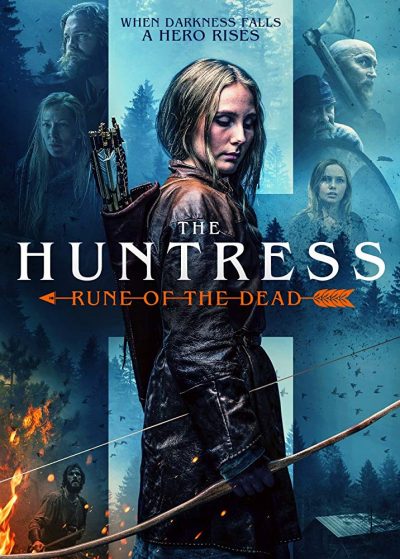★★★
“Spirits in the sky.”

kinopoisk.ru
This was made in the early eighties, when the Soviet Union and United States were making loud, growling sounds at each other. Being a product of that era perhaps explains the way this feels almost like a propaganda film, made to inspire the population to be prepared to fight in defense of the motherland. Its closest cousin on this site is therefore the similar Chinese film, The Red Detachment of Women. The topic here is one we’ve covered before: the renowned “Night Witches”, the all-female air force squadron, who carried out reconnaissance and bombing missions against the Germans on the Eastern front, during the second half of World War II.
The two central characters are Galya Polikarpova (Druz) and Oksana Zakharchenko (Grushina). The former is recuperating from injury in hospital, but sneaks out against doctor’s orders in order to rejoin her colleagues on the front lines. The pair are hauled over the coals for this by their long-suffering commanding officer (Menshikova), but are able to escape punishment due to the shortage of fliers making operational needs more important. Thereafter… Well, to be perfectly honest, not a great deal happens, and the film comes in at less than 80 minutes. At points, it almost feels like an edited-down version of a longer feature.
For instance, there’s one point where they are being harried by a Messerschmitt – then, suddenly, they’re landing in a field to sweep up an orphaned boy, Fyodor (Zamulin), who becomes an unofficial mascot of the squadron, despite efforts by the higher-ups to send him away. There’s also a long-distance romance between Galya and another soldier that didn’t do much for me.
However, one point about this production is particularly worth noting. Director Yevgeniya Zhigulenko was actually a “night witch” herself, having been a member of the 588th Night Bomber Regiment. Initially a navigator in May 1942, she became a pilot and eventually a flight commander. By the end of the war, she had flown close to a thousand sorties, and been awarded the title of Hero of the Soviet Union. There can’t be many films from any country set in World War II, which were directed by someone who took part in the events depicted.
This was one of two features she made, and seems more functional than particularly artistic, though may have been constrained by its budget. Some of the flying sequences are… let’s say, not particularly convincing. But perhaps due to the director’s background, it does have a down-to-earth (pun not intended) approach which does occasionally work in the film’s favour. One example would be when the women are struggling to get their planes launched out of the mud, after heavy rain. But generally, the tempo is kept upbeat and patriotically optimistic, with only occasional nods to the heavy toll of life taken by the conflict. All told, a decent effort; I’d just give the edge to the TV series Night Swallows, whose greater length allows for more depth in its characterizations.
Dir: Yevgeniya Zhigulenko
Star: Yana Druz, Valentina Grushina, Dima Zamulin, Nina Menshikova
a.k.a. V nebe ‘Nochnye vedmy’





 After an incident where she shoots dead a woman armed only with a toy gun, Marie (DeCianni) quite the police force to become a housewife. However, her husband, Barry (Spadaro), has some dodgy friends, in particular, Nadi (Regina, who also co-wrote this), a man with ties to organized crime. Barry falls behind on payments, and an unfortunate car “accident” befalls him: a recent large life-insurance policy named Nadi as the beneficiary. It’s all very shady, as Marie’s old police captain (Session) admits. However, there is just not enough evidence for the authorities to take action. That’s not an issue for Marie, however, who decides to take revenge for the loss of her husband, against Nadi and his associates.
After an incident where she shoots dead a woman armed only with a toy gun, Marie (DeCianni) quite the police force to become a housewife. However, her husband, Barry (Spadaro), has some dodgy friends, in particular, Nadi (Regina, who also co-wrote this), a man with ties to organized crime. Barry falls behind on payments, and an unfortunate car “accident” befalls him: a recent large life-insurance policy named Nadi as the beneficiary. It’s all very shady, as Marie’s old police captain (Session) admits. However, there is just not enough evidence for the authorities to take action. That’s not an issue for Marie, however, who decides to take revenge for the loss of her husband, against Nadi and his associates. Megan Fox may not exactly be the first name which comes to mind when you think “battle-hardened mercenary leader.” But if you can get past your preconceptions, she’s definitely not the worst thing about this. We’ll get to what
Megan Fox may not exactly be the first name which comes to mind when you think “battle-hardened mercenary leader.” But if you can get past your preconceptions, she’s definitely not the worst thing about this. We’ll get to what  Wildlife photographer Harper Sykes (Dexter-Jones) is out in the wilderness of the “Watchatoomy Valley” [fictitious, but apparently located somewhere in the Virginias], when she stumbles across a group of men brutally attacking a victim. She snaps a few pics before fleeing the scene, but her attempts to report the incident to the authorities backfire immediately, and she quickly finds herself at the mercy of their leader, the appropriately-named Ravener (Longstreet). He explains the victim was a scout for big business, whose predations would destroy the natural environment, and so had to be stopped. Now, Harper is next in line. However, she is not the innocent and helpless victim they think. Even when she has the chance to escape, Harper decides to stay in the valley, and take vengeance on Ravener and the rest of his clan.
Wildlife photographer Harper Sykes (Dexter-Jones) is out in the wilderness of the “Watchatoomy Valley” [fictitious, but apparently located somewhere in the Virginias], when she stumbles across a group of men brutally attacking a victim. She snaps a few pics before fleeing the scene, but her attempts to report the incident to the authorities backfire immediately, and she quickly finds herself at the mercy of their leader, the appropriately-named Ravener (Longstreet). He explains the victim was a scout for big business, whose predations would destroy the natural environment, and so had to be stopped. Now, Harper is next in line. However, she is not the innocent and helpless victim they think. Even when she has the chance to escape, Harper decides to stay in the valley, and take vengeance on Ravener and the rest of his clan. Firstly, I’m still trying to figure out the relevance of the cover (right). With a heroine named Kat, why is there a dog pictured? It’s not as if she even owns one at any point. The “size of the fight” line… well, tenuous at best. I should probably have listened to my instincts and skipped this frankly implausible tale, about a teenage girl who is smart, attractive and a black-belt martial artist with 34E breasts. Yet she ends up having to get work as a stripper, a job at which she is naturally brilliant (thanks to adopting a pseudo-Xena persona), in order to keep her alcoholic mother out of debt. She breaks the arm of a particularly unpleasant customer, Alex, an act which gets her the attention of Alex’s business partner. He runs McKenzie Personal Security, and offers Kat a job as a trainee bodyguard.
Firstly, I’m still trying to figure out the relevance of the cover (right). With a heroine named Kat, why is there a dog pictured? It’s not as if she even owns one at any point. The “size of the fight” line… well, tenuous at best. I should probably have listened to my instincts and skipped this frankly implausible tale, about a teenage girl who is smart, attractive and a black-belt martial artist with 34E breasts. Yet she ends up having to get work as a stripper, a job at which she is naturally brilliant (thanks to adopting a pseudo-Xena persona), in order to keep her alcoholic mother out of debt. She breaks the arm of a particularly unpleasant customer, Alex, an act which gets her the attention of Alex’s business partner. He runs McKenzie Personal Security, and offers Kat a job as a trainee bodyguard. Turns out that The Asylum are not the only company who makes mockbusters. As its alternate name makes clear, this Lifetime TVM is clearly a knock-off of the title mentioned above, down to the same, basic plot. Two teenage girls begin doing crime, largely for the excitement. A teacher becomes aware of their exploits and decides to blackmail them for his own benefit, by making them escalate their activities. This brings them increasingly under the scrutiny of both authorities and criminal elements, not to mention parental disapproval, eventually leading to a climax where all these aspects cross paths. As my
Turns out that The Asylum are not the only company who makes mockbusters. As its alternate name makes clear, this Lifetime TVM is clearly a knock-off of the title mentioned above, down to the same, basic plot. Two teenage girls begin doing crime, largely for the excitement. A teacher becomes aware of their exploits and decides to blackmail them for his own benefit, by making them escalate their activities. This brings them increasingly under the scrutiny of both authorities and criminal elements, not to mention parental disapproval, eventually leading to a climax where all these aspects cross paths. As my  Another example which illustrates the difference between Western and Japanese approaches to education. For here we have “Class Black”, a group containing a baker’s dozen of female pupils, eleven of whom have been tasked by a mysterious group to assassinate the twelfth, with the person who does it being given absolutely anything they want by the organizers. Yeah, it’s not
Another example which illustrates the difference between Western and Japanese approaches to education. For here we have “Class Black”, a group containing a baker’s dozen of female pupils, eleven of whom have been tasked by a mysterious group to assassinate the twelfth, with the person who does it being given absolutely anything they want by the organizers. Yeah, it’s not  In 9th-century Scandinavia, teenage girl Runa (Stefansdotter) lives deep in the woods, with her mother, Magnhild (Idah), blind grandfather Ragnvald (Beck) and younger sister Bothild (Lyngbrant). Father Joar is notable by his absence, having gone off on a Viking raid to seek fortune for the family, and is now well overdue. However, he did at least train Runa to be a markswoman with the bow. Problems start when she finds a wounded warrior, Torulf, lying in the forest, and brings him back to their cabin, much against Magnhild’s wishes.
In 9th-century Scandinavia, teenage girl Runa (Stefansdotter) lives deep in the woods, with her mother, Magnhild (Idah), blind grandfather Ragnvald (Beck) and younger sister Bothild (Lyngbrant). Father Joar is notable by his absence, having gone off on a Viking raid to seek fortune for the family, and is now well overdue. However, he did at least train Runa to be a markswoman with the bow. Problems start when she finds a wounded warrior, Torulf, lying in the forest, and brings him back to their cabin, much against Magnhild’s wishes. The profession of journalist is not exactly well-regarded by many people these days. So it’s nice occasionally to be reminded that they can still potentially be action heroes, risking their own lives in pursuit of the truth. In this case, it’s Marie Colvin (Pike), a foreign correspondent for London’s Sunday Times newspaper, who lost an eye while covering the civil strife in Sri Lanka, leading to a piratical eye-patch for the rest of her career. Most people would treat that as a sign from the universe to look into a change of profession. But Colvin was made of sterner stuff, despite a hellacious case of post-traumatic stress disorder, with which she largely coped by drinking heavily. So she and photographer sidekick Paul Conroy (Dornan) continue to venture into the world’s hot-spots, whether it’s Iraq, Libya or Syria. There, they expose the terrible human cost that the conflicts have on the local population, without apparent concern for their own safety.
The profession of journalist is not exactly well-regarded by many people these days. So it’s nice occasionally to be reminded that they can still potentially be action heroes, risking their own lives in pursuit of the truth. In this case, it’s Marie Colvin (Pike), a foreign correspondent for London’s Sunday Times newspaper, who lost an eye while covering the civil strife in Sri Lanka, leading to a piratical eye-patch for the rest of her career. Most people would treat that as a sign from the universe to look into a change of profession. But Colvin was made of sterner stuff, despite a hellacious case of post-traumatic stress disorder, with which she largely coped by drinking heavily. So she and photographer sidekick Paul Conroy (Dornan) continue to venture into the world’s hot-spots, whether it’s Iraq, Libya or Syria. There, they expose the terrible human cost that the conflicts have on the local population, without apparent concern for their own safety. Former WWF star Lesseos, where she was known as the Fabulous Mimi, carved out a small career for herself in low-budget action films, mostly in the mid-nineties. Though the ones we’ve covered before, such as
Former WWF star Lesseos, where she was known as the Fabulous Mimi, carved out a small career for herself in low-budget action films, mostly in the mid-nineties. Though the ones we’ve covered before, such as